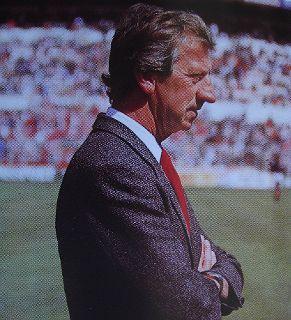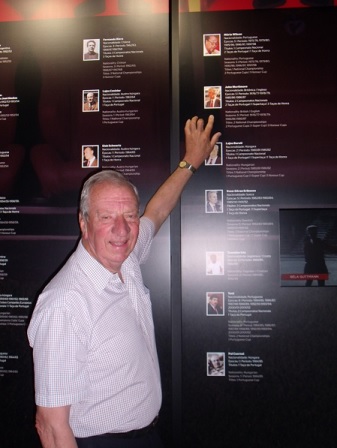
Tell us a bit about how you came to take the Benfica job for the first time back in 1976?
The Benfica job came up through the Football Association and I jumped at the opportunity. I think the club approached the FA, who recommended one or two people and we were interviewed. I moved to Lisbon with my family and my wife used to teach at one of the schools out there.
It was a tremendous experience for me and to a degree there was some pressure to win things. I remember looking at the team early on, studying them and thinking there were probably a couple not quite up to the standard of the rest of them, because the majority of them were international players. But there were one or two positions that needed improving, so I watched the youth team a couple of times, which was always my natural inclination because I’m an ex-schoolmaster, an ex-PE teacher.
I love developing young players coming through and I saw one or two players in the juniors who I thought were better than what I’d got in the first team, so I decided I was going to pinch them and I got them playing in the first team after about half a dozen games. One of them was a left-sided player called [Fernando] Chalana and then there was José Luís, who was a right-sided midfielder, a No7. Then there was a big lad, Alberto, who played centre-back for the juniors but I put him in the first team at left-back.
They had first-team potential and they looked better prospects than the players who were in the first team at that particular time. What can I say? You see something in them and you stick by it.
[All three of the above-mentioned players became multiple champions with Benfica and Portugal internationals.]
Did you ever stop to think about the size of the club and the history they had when you went there?
Yes, although if I had a foundation for the experience of coaching a team like Benfica it came from my time in Greece, which was a great help. Ethnikos has shared this big stadium outside Athens with Olympiakos and one of the other teams in Athens at the time, Panathinaikos, had Ferenc Puskás as manager, so it was certainly an experience that stood me in good stead, but going to Benfica was like stepping up a ladder.
Before you arrived in Lisbon, Benfica had another English manager called Jimmy Hagan. Did you speak to him at all before taking the job?
Well, I should tell you a story. When I was a boy at school in Farnborough, Jimmy Hagan used to play for nearby Aldershot because he was in the services in those days and was billeted in Aldershot. I watched him play an Army Cup Final and he became my hero, one of those guys that a boy watches play and he is a great character, he scores goals and works hard. I remember taking the afternoon off school to watch him play and when I went back to school the next morning, those boys who had been to the final – mainly to watch Jimmy play – had to bend over for six of the best! It was worth it, though. It was worth six of the best to see Jimmy Hagan play.
In Portugal, Jimmy and I became good friends. When he was coaching Sporting and I was at Benfica, I made a point of going to tell him what I thought about him, from his Army days, and we became good friends. He did very well because he had been at Benfica and went to Sporting afterwards, which wasn’t usual, but somebody like Jimmy Hagan has the ability to do that.
Did you adapt well to life in Portugal?
I was very fortunate because we had been on tours of Brazil and Africa shortly after I arrived. You go to these places and what language do they speak, but Portuguese! I had an interpreter to start with, obviously – a very nice chap, who was very helpful and very popular among the players – and I said to myself, “John, you’ve got to learn this language.”
I’d been to Brazil, to countries in Africa, and I was living in Portugal, and they all used the same language. So I did a crash course to learn Portuguese and it was a great help because, although I kept my interpreter going, I found myself learning the language very quickly. It was a necessity really.
Did you have any compatriots on the coaching staff with you, or did you go it alone?
I went alone, although I did appoint one of the players as a coach during my second spell at Benfica. I had a very good captain called Toni, who was sort of finishing his career, and he was a good lad, he knew the game well and had been captain, so he joined the coaching side with me. One of my goalkeepers, Bento, did the same, taking the goalkeepers in training. We were a team – I wasn’t just there on my own.
Really, you were there as a coach; you weren’t there as a manager. You had your director of football, or director of sport and various other people who did all the office work, so to speak, whereas the coach – the trainer – was out there on the field. So you didn’t leave things to somebody else if you wanted a certain thing done, you did it yourself.
Eusébio was there, of course, and I used to leave him to take the Under-18s for matches. If I wanted anybody to train with the goalkeepers, I’d let Eusébio do it because he was the best kicker I had ever come across – he used to love taking the goalkeepers for training because it meant he was shooting at goal all the time!
Eusébio was a tremendous guy. He was from Mozambique and I had been down in the southern part of Africa coaching, so we had a sort of link there. We became very good friends, he was a great player, but a great person. His football reflected his personality and he was not a conceited fellow at all.
What were the major differences between British football and continental football at that time?
Most teams abroad at that time used to play with a sweeper – they would have three defenders there against two strikers most of the time and I felt that you needed to stretch those three defenders out. If you played with one centre-forward and two wide players, you stretched the other side out and that caused them problems.
We played 4-3-3 because I wanted width and you must understand that they were a very good club and a good team, who had been brought up in the winning ways. You wanted them to go and win games, so you felt if you could stretch out the opposition, then much the better.
Most goalkeepers didn’t get out and about their box in those days, they stayed on their line a lot, and clubs played with a sweeper.
Let’s get onto how that team did. You won the league by nine points in your first season in charge…
Yes, we won the championship in 1976/77, which was the start of my first spell there – I didn’t realise it was as much as nine points! We came second to Porto the following year, on goal difference and were second again, by one point, in 1978/79.
When I went back in 1985/86, we got second place in my first season, but we won the Portuguese Cup and the following year we won the championship and the cup.
How were you greeted when you returned for your second spell at the club in 1985?
 John points himself out at the Benfica museum
John points himself out at the Benfica museumVery warmly, I must admit. There is a characteristic about the club that they keep in touch with their ex-players and coaches. There is a man there now who was there as a player with me and he does a lot of the hosting now, a lad named Shéu, and he came from Mozambique.
I went out to Portugal with my wife and daughter and they have a museum now with quite a young looking John Mortimore in it! I was looking through the museum and Shéu came up to me and welcomed me back.
There is a tremendous spirit within the club because it was something bigger than a football club. I can’t remember the number of sports they played, but it was in double figures.
After a season in Spain, with Real Betis, you returned to Portugal briefly with Belenenses. How did that come about?
That was in 1988/89, but I didn’t stay on until the end of the season when they won the cup. There were a couple of players who went to Belenenses from Benfica and one lad, José Antonio, wasn’t a first-team player at Benfica but we got on very well. So when Belenenses wanted a new manager he recommended me, so I went there from Real Betis.
It was a very nice club, where I was welcomed in. There was no rivalry or nastiness from my team at Benfica, even though they are both in Lisbon, but I didn’t stay there for long. I think it was just the case that an opportunity came up to return home and I took it.
Belenenses had a wonderful stadium and the position of it – where the club is in Belém – is by the docks, along the front, and it was a very respected club. It had a good name and it was a very good area as well, I think there were a few grand buildings out that way and it was a fantastic little place.
Many years later, when Chelsea met Benfica in the Champions League quarter-final in 2012, you were invited to walk around the pitch at Stamford Bridge at half-time and you received a standing ovation from both sets of supporters. What emotions did you experience that evening?
[At this point there is a catch in John’s voice] You’re almost bringing tears to my eyes! It was such an experience and there is nothing else like it, I don’t know how you can make any comparisons with that. To walk from one penalty area to the other, when there were supporters of both teams there, was fantastic. It was nice to be able to go to all sides of the ground and be welcomed all the way round. I haven’t got words to describe it. It was just a great, great experience.
By Dominic Bliss

